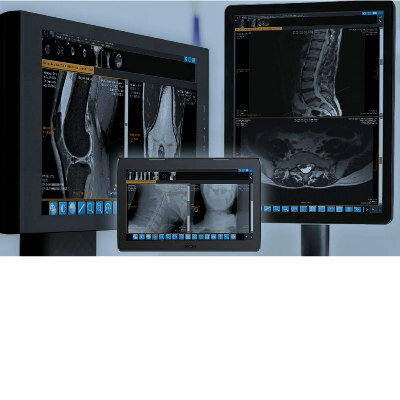AI Technique Automatically Traces Tumors in Large MRI Datasets to Guide Real-time Glioblastoma Treatment
|
By MedImaging International staff writers Posted on 16 Nov 2023 |

Treating glioblastoma, a prevalent and aggressive brain cancer, involves the use of radiation therapy guided by CT imaging. While this method is effective in targeting radiation, it doesn't provide real-time information about the tumor's response to the treatment. This gap means that clinicians are unable to determine whether a patient's cancer is responding to the treatment or progressing until follow-up images are taken, sometimes months later. Given the rapid progression of glioblastoma, such delays can have critical consequences.
To address this challenge, a team of researchers at Sylvester Comprehensive Cancer Center, part of the University of Miami Miller School of Medicine, (Coral Gables, FL, USA) is utilizing a technique called MRI-guided radiation therapy. This method integrates daily MRI scans with radiation treatments. MRI technology illuminates the brain tumor, assisting in guiding the radiation beams. Importantly, the detailed images produced by MRIs also offer the possibility of near real-time monitoring of the tumor's response or progression. However, this advanced approach generates a substantial volume of data. For the 36 patients with glioblastoma in their study, each of the 31 time points included between four and six distinct images. To efficiently analyze this wealth of information, the team has employed artificial intelligence.
The AI-based solution developed by the researchers automatically delineates glioblastoma tumors and the resection cavities—spaces remaining after surgical removal of tumors—within these extensive MRI datasets. This automated tracing of tumors and cavities allows for tracking of tumor growth or reduction throughout the treatment. The algorithm, an adaptation from previous work in cervical cancer, can swiftly calculate the precise volume of the tumor and track changes over time. This AI method also offers a significant reduction in time compared to manual analysis, which can take over 20 hours per patient. The AI can process the same data in approximately 90 minutes.
Looking forward, the team plans to enhance the machine learning approach to include additional data from the MRI images. A key focus is identifying pseudo-progression, a condition where the tumor appears to grow due to treatment-induced swelling but ultimately recedes. This distinction between actual tumor growth and pseudo-progression is a crucial but challenging aspect of the research. The researchers are designing a study to evaluate tumor progression in glioblastoma patients undergoing MRI-guided radiation therapy on a weekly basis. They aim to adjust treatments in real-time based on the response of the tumors or changes in their size, utilizing the new machine learning method to facilitate swift treatment modifications.
“You can monitor so many different qualities of the tumor with MRI. That’s an untapped frontier,” said Adrian Breto, a doctoral student and programmer. “We haven’t gone yet to the center of the earth as far as what MRI can tell us about the patient’s disease and quality of life. That’s what we’re trying to do, squeeze as much information as we can out of these images for the benefit of the patient.”
Related Links:
Miller School of Medicine
Latest MRI News
- PET/MRI Improves Diagnostic Accuracy for Prostate Cancer Patients
- Next Generation MR-Guided Focused Ultrasound Ushers In Future of Incisionless Neurosurgery
- Two-Part MRI Scan Detects Prostate Cancer More Quickly without Compromising Diagnostic Quality
- World’s Most Powerful MRI Machine Images Living Brain with Unrivaled Clarity
- New Whole-Body Imaging Technology Makes It Possible to View Inflammation on MRI Scan
- Combining Prostate MRI with Blood Test Can Avoid Unnecessary Prostate Biopsies
- New Treatment Combines MRI and Ultrasound to Control Prostate Cancer without Serious Side Effects
- MRI Improves Diagnosis and Treatment of Prostate Cancer
- Combined PET-MRI Scan Improves Treatment for Early Breast Cancer Patients
- 4D MRI Could Improve Clinical Assessment of Heart Blood Flow Abnormalities
- MRI-Guided Focused Ultrasound Therapy Shows Promise in Treating Prostate Cancer
- AI-Based MRI Tool Outperforms Current Brain Tumor Diagnosis Methods
- DW-MRI Lights up Small Ovarian Lesions like Light Bulbs
- Abbreviated Breast MRI Effective for High-Risk Screening without Compromising Diagnostic Accuracy
- New MRI Method Detects Alzheimer’s Earlier in People without Clinical Signs
- MRI Monitoring Reduces Mortality in Women at High Risk of BRCA1 Breast Cancer
Channels
Radiography
view channel
Novel Breast Imaging System Proves As Effective As Mammography
Breast cancer remains the most frequently diagnosed cancer among women. It is projected that one in eight women will be diagnosed with breast cancer during her lifetime, and one in 42 women who turn 50... Read more
AI Assistance Improves Breast-Cancer Screening by Reducing False Positives
Radiologists typically detect one case of cancer for every 200 mammograms reviewed. However, these evaluations often result in false positives, leading to unnecessary patient recalls for additional testing,... Read moreUltrasound
view channel
Deep Learning Advances Super-Resolution Ultrasound Imaging
Ultrasound localization microscopy (ULM) is an advanced imaging technique that offers high-resolution visualization of microvascular structures. It employs microbubbles, FDA-approved contrast agents, injected... Read more
Novel Ultrasound-Launched Targeted Nanoparticle Eliminates Biofilm and Bacterial Infection
Biofilms, formed by bacteria aggregating into dense communities for protection against harsh environmental conditions, are a significant contributor to various infectious diseases. Biofilms frequently... Read moreNuclear Medicine
view channel
New SPECT/CT Technique Could Change Imaging Practices and Increase Patient Access
The development of lead-212 (212Pb)-PSMA–based targeted alpha therapy (TAT) is garnering significant interest in treating patients with metastatic castration-resistant prostate cancer. The imaging of 212Pb,... Read moreNew Radiotheranostic System Detects and Treats Ovarian Cancer Noninvasively
Ovarian cancer is the most lethal gynecological cancer, with less than a 30% five-year survival rate for those diagnosed in late stages. Despite surgery and platinum-based chemotherapy being the standard... Read more
AI System Automatically and Reliably Detects Cardiac Amyloidosis Using Scintigraphy Imaging
Cardiac amyloidosis, a condition characterized by the buildup of abnormal protein deposits (amyloids) in the heart muscle, severely affects heart function and can lead to heart failure or death without... Read moreGeneral/Advanced Imaging
view channel
New AI Method Captures Uncertainty in Medical Images
In the field of biomedicine, segmentation is the process of annotating pixels from an important structure in medical images, such as organs or cells. Artificial Intelligence (AI) models are utilized to... Read more.jpg)
CT Coronary Angiography Reduces Need for Invasive Tests to Diagnose Coronary Artery Disease
Coronary artery disease (CAD), one of the leading causes of death worldwide, involves the narrowing of coronary arteries due to atherosclerosis, resulting in insufficient blood flow to the heart muscle.... Read more
Novel Blood Test Could Reduce Need for PET Imaging of Patients with Alzheimer’s
Alzheimer's disease (AD), a condition marked by cognitive decline and the presence of beta-amyloid (Aβ) plaques and neurofibrillary tangles in the brain, poses diagnostic challenges. Amyloid positron emission... Read more.jpg)
CT-Based Deep Learning Algorithm Accurately Differentiates Benign From Malignant Vertebral Fractures
The rise in the aging population is expected to result in a corresponding increase in the prevalence of vertebral fractures which can cause back pain or neurologic compromise, leading to impaired function... Read moreImaging IT
view channel
New Google Cloud Medical Imaging Suite Makes Imaging Healthcare Data More Accessible
Medical imaging is a critical tool used to diagnose patients, and there are billions of medical images scanned globally each year. Imaging data accounts for about 90% of all healthcare data1 and, until... Read more
Global AI in Medical Diagnostics Market to Be Driven by Demand for Image Recognition in Radiology
The global artificial intelligence (AI) in medical diagnostics market is expanding with early disease detection being one of its key applications and image recognition becoming a compelling consumer proposition... Read moreIndustry News
view channel
Bayer and Google Partner on New AI Product for Radiologists
Medical imaging data comprises around 90% of all healthcare data, and it is a highly complex and rich clinical data modality and serves as a vital tool for diagnosing patients. Each year, billions of medical... Read more




















